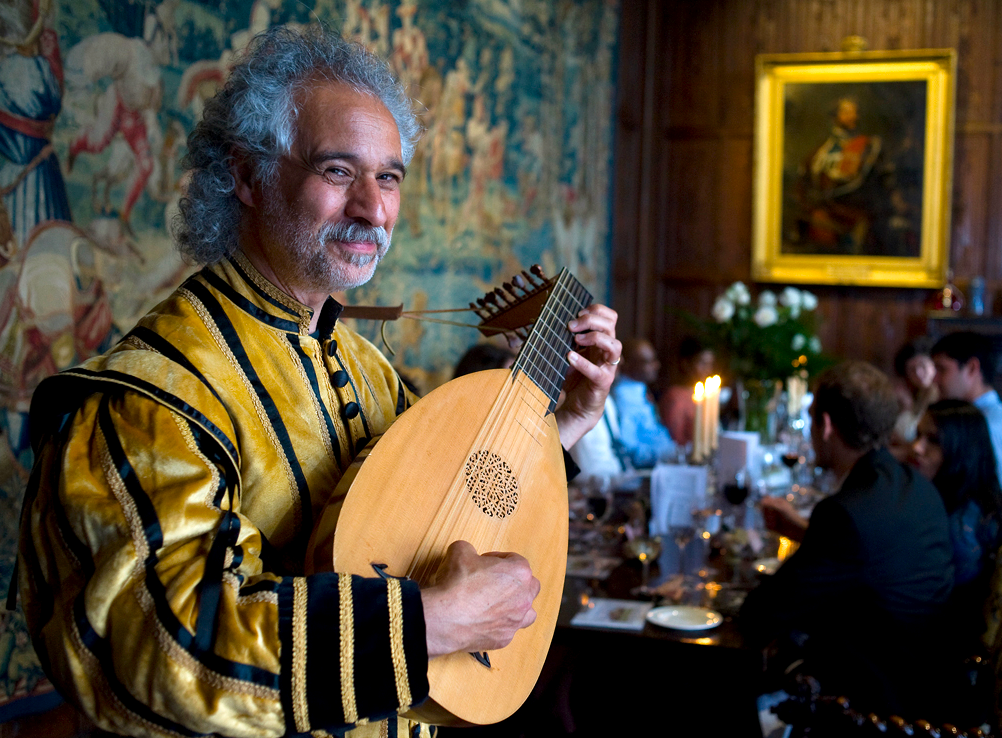

Tudor Music is the theme for this week’s #TudorTuesdays with Historic Houses.
Unlike the upper class pursuits of jousting or falconry, music was enjoyed by all sectors of Tudor society. The only differences were the types of instruments they played and the songs they favoured.
Unlike the grand moderns orchestras of today, Tudor musicians (or ‘minstrels’ as they were known) had a much smaller array of instruments to choose from, and even at Royal events would only have played in small groups. In fact, for the first glimpse of what we would probably recognise as a ‘modern’ orchestra (with specific groups of instruments assigned specific parts of music to play together) we have to fast forward almost 1607 years and hop across the continent to Italy to visit the composer Claudio Monteverdi. But we’ll save that for another time!
In terms of the type of instruments used in Tudor times, by far the most popular and varied were the string instruments. These included the harp, early guitar forerunner the citole, violin forerunners the viol and rebec, and an instrument known as a hurdy-gurdy, which had both strings and keys and was played by turning a small wheel on the side.
As well as stringed instruments, flutes were also incredibly popular, as were bagpipes and recorders (the bane of many a 20th and 21st century school music lesson. Although it is worth noting that King Henry VIII was considered an excellent recorder player).
When it comes to the type of Tudor music that was enjoyed, the wealthy would have had their own minstrels to play to them during dinner. Those in the Royal Court would have been able to enjoy the latest musical offerings from the continent, and from Henry himself, who along with being an ace recorder player, was also a keen composer, although sadly, all of his works have since been lost.
For the poor, music would have been reserved for Sundays (the only day of the week that they did not have to work) and holidays such as May Day, which would have been marked with music, dancing and merrymaking. All of which just goes to prove that (despite the obvious differences) music today and Tudor music had a similar effect. It could be enjoyed by everyone, it brought people together, and, more crucially still, it made people happy.
Hever Castle continues to celebrate music. Former owner William Waldorf Astor had a minstrel’s gallery added to the Dining Room when he bought Hever Castle at the turn of the 20th century.
Young visitors to Hever Castle can try out more modern musical instruments as part of the Tudor Towers adventure playground.
And special events in the Astor Wing of Hever Castle sees visitors hearing traditional Tudor Music from Dante Ferrara (pictured above).
He says: “What finer place to perform Tudor music than at Hever Castle. And being given the opportunity to entertain visitors with my instruments and songs, I take relish in echoing the music that was heard centuries ago.
“For special events I usually greet guests on their arrival with the hurdy-gurdy. This is a complex instrument with strings, keyboard and a circular bow and gives a highly individual sound, perfect for lively dance tunes – Tudor party music!
“My other instruments include the lute, cittern, colascione and English bagpipes. The lute is often seen in period dramas, stage and film and its gently plucked gut strings provide delicate background music fit for high society. My cittern is a copy of one often seen in paintings by Vermeer and its sound is quite different to the lute as its strings are of iron and brass, played with a quill. It’s perfect to accompany songs and ballads.
“Not so common is the colascione which was never used in England. It’s from southern Italy and this reflects my personal heritage. It forms part of the lute family and was was used for street entertainment and theatre. The only wind instrument I play is English bagpipes which have a gentle, pastoral sound that often surprises the first-time listener.”
If you enjoyed this item on Tudor Music, why not discover more about Tudor Tuesdays.
Book your visit to Hever Castle & Gardens.
Within the grounds of the Hever Castle Estate, there are two opportunities for you to stay the night with us.
Hever Castle has played host to many important events and celebrations for over 600 years. In 1903 when William Waldorf Astor set about restoring Hever Castle to its former glory, he added the Astor Wing, to accommodate his family and guests, before creating a lake and the spectacular Italian Garden to house his impressive collection of ancient Greek and Roman statuary.
There are multiple places to eat & drink across the Hever Castle Estate. Select between the Castle & Gardens and Golf Club below to discover more.
Set in the mature grounds of the Hever Castle Estate, Hever Castle Golf Club is a 27 hole Kent golf course that will encourage and inspire all golf enthusiasts.
Set in the mature grounds of the Hever Castle Estate, the Wellbeing Centre consists of five smart treatment rooms.